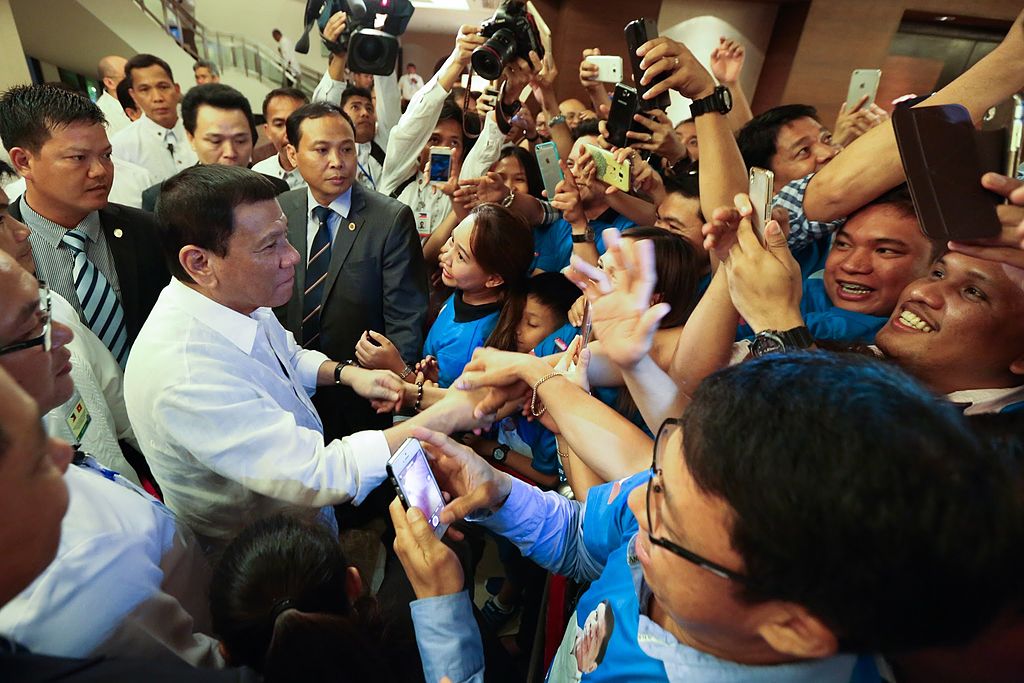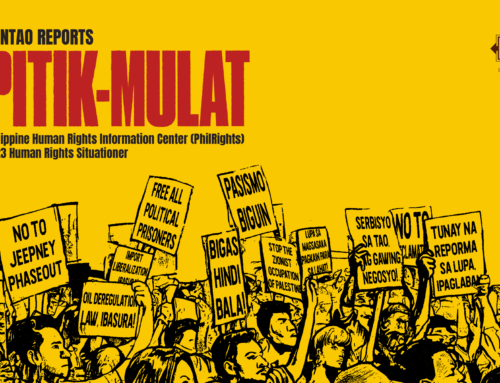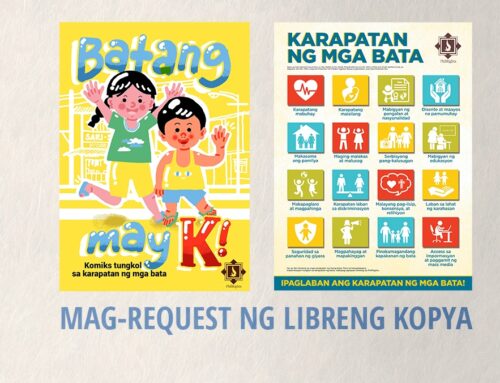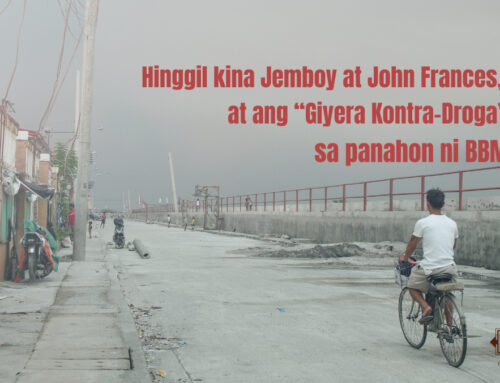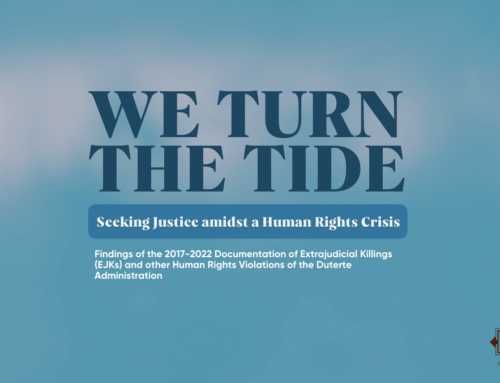by Napat Rungsrithananon
The Philippines’ ongoing campaign against illegal drugs is a bloody crusade which Duterte enjoys touting proudly. The policy is based off of his very own violent strategy employed back when he was the mayor of Davao City–where he allegedly told police officers: “Throw them [drug dealers and users] in the ocean or the quarry. Make it clean. Make sure there are no traces of the bodies.”
Indeed, Duterte won the presidential election on promises to rid the country of drugs and crime; that is, to repeat his claimed accomplishments as mayor. It must be noted, however, that Davao still has the highest murder rate and the second highest number of rapes in the country. Philippine police’s own data ranks Davao as among the most dangerous cities in the Philippines.
Regarding the new national anti-illegal drug campaign, while the Philippine National Police (PNP) claimed that only around 4,000 suspects died in what they deemed as legitimate police operations since July 2016, independent estimates of deaths linked to the bloody campaign are considerably higher. The 2018 Annual Report released by Human Rights Watch (HRW) suggests over 12,000 deaths. This figure is also in line with those coming from other non-governmental organizations such as the International Drug Policy Consortium, media outlets including The New York Times, and religious groups like the Catholic Bishop’s Conference of the Philippines.
Unsurprisingly, the government has firmly rejected the death tolls estimated by the HRW and demanded that they issue a public apology.
While there is much dispute and confusion over the death tolls linked to the anti-illegal drug campaign, the consensus among human rights organizations is that majority of the killings–those beyond the 4,000 deaths acknowledged by the PNP–were extrajudicial and carried out, often nightly, by unidentified gunmen.
While the government may be quick to attribute the blame and any allegation of unlawful killings to a minority of “scalawags” in the police ranks or to vigilante groups, the fact is the government itself instigated and continues to incite these summary killings. Not only has Duterte himself encouraged police to shoot drug suspects who resist, he has also vowed to pardon and promote any police personnel implicated in unlawful killings–with a case in point being as recent as in May 2018 where two senior police officers who oversaw one of the campaign’s bloodiest locales were promoted.
The severity of the situation can also be reflected in the decision of The Hague-based International Criminal Court to launch a preliminary examination into allegations that the killings amount to crimes against humanity – defined as “serious violations committed as part of a large-scale attack against any civilian population.”
“One narrative that can explain the persistent popularity of Duterte and his anti-illegal drug crusade credits the effective use of political emotion.”
Political Emotion: Key to Duterte’s popularity?
Despite being accused of having committed crimes against humanity and despite mounting evidence of large-scale extrajudicial killings, Duterte, with his so-called war on drugs, still remains widely popular amongst Filipinos. One may rightly ask why. Why is it that he still remains the favorite among the country’s presidents? Are Filipinos really so indifferent to the untried killings that have been taking place on such a grand scale?
Following the mass protests triggered by the tragic incident where an innocent 17-year-old high school student, Kian de los Santos, was murdered execution-style in August 2017, President Duterte appeared to have taken a tumble in his ratings, and analysts were quick to suggest that Duterte’s popularity might be coming to an end. They were wrong. According to the Social Weather Stations, the Duterte’s net satisfaction rating rebounded in the following quarter, obtaining a “very good” rating, while, according to an October 2017 Pulse Asia survey, 88% of Filipinos specifically supported the anti-illegal drug campaign.
One narrative that can explain the persistent popularity of Duterte and his anti-illegal drug crusade credits the effective use of political emotion. Referring to one’s emotional attachment or one’s response to political ideas based on emotion, the concept itself is not inherently good nor evil. When a country rises up in the name of justice and liberty, that is a political emotion. When a country begins putting up fences to keep out refugees in fear of crime and terrorism, that is also a political emotion.
Indeed, while great democratic leaders of the past–including Lincoln, Gandhi and King (Martin Luther King, Jr.)–understood the importance of cultivating emotions when seeking to rally support for a particular cause, so did Mussolini, Lenin and Hitler.
Political emotion is more than capable of clouding one’s judgement, and, unfortunately, the concept is being employed to do exactly this in the Philippines. By forcefully repeating his incendiary remarks on illegal drugs and illegal drug-related crimes, Duterte has successfully evoked his desired political emotion amongst the public, playing on their insecurity related to the violence created by the illegal drug trade, their anger at what they perceive as the previous government’s failure to effectively respond to the problem, and the hope that a harsher response to drugs will ultimately eradicate the drug problem.
Perplexingly, while 73% of Filipinos believe that extrajudicial killings are really occurring in the course of Duterte’s anti-drug campaign–the government after all publicly denies it–and 76% fear that they themselves or someone they know may suffer the same fate as 17-year-old Kian (who was dragged from his family’s sari-sari store and shot by policemen), the majority of Filipinos from all parts of the country still support the campaign and report that they feel safer on the streets.
Such contradictory positions highlight the role of irrational emotion involved in the population’s support for the campaign while reflecting the effectiveness of Duterte’s deployment of political emotion coupled with his macho posturing. These perplexing scenarios also suggest that the Filipinos are willing to turn a blind eye to the suffering of the minority in exchange for a heightened sense of security–even though that sense of insecurity is in many ways actively incited by Duterte himself.
“The huge drop in satisfaction ratings is perhaps surprising only for its belatedness.”
Is the Tide Turning?
This week’s poll results on the public’s satisfaction with Duterte might suggest a new turning point, however. Based on the Social Weather Stations’ (SWS) Second Quarter 2018 Social Weather Survey, Duterte’s net satisfaction dropped by a whopping 11 points from the first quarter’s 56% to 45% for the second quarter. As the Philippine Star notes, this is a new personal low for the president, who now has a satisfaction rating grade of “good,” as per SWS’s ratings classification.
These results arrive on the heels of a sustained onslaught of negative news for Duterte. With inflation at record levels, highly publicized killings of priests and local executives, and more muted but still alarming reports of alleged extrajudicial killings related to the government’s so-called “war on drugs,” the huge drop in satisfaction ratings is perhaps surprising only for its belatedness.
But as the ratings drop circa September 2017 shows, Duterte’s popularity can just as easily bounce back. Just as important, the current 45% net satisfaction rating is still good as far as the SWS is concerned. What this suggests is that negative news, no matter how compounded and multifarious, can only cause temporary dents on Duterte’s enduring popularity. It is also easy to imagine that Duterte’s team can just as quickly engineer an effective response to this ratings tumble to gain back lost public trust.
In other words, Duterte’s mastery of political emotion and the resultant hold on the public imagination is such that traditional models of opposition and counternarratives cannot erode what is essentially a self-perpetuating popularity machine. When near daily reports of killings of everyone from priests to local executives to four-year-old kids do not deter the public from supporting the president, perhaps a tipping point is not as close as Duterte’s opponents would hope.
Going forward, it would be interesting yet terrifying to imagine what else could be accomplished with a similar and effective use of political emotion. After all, the rhetoric employed by Duterte has appeared to successfully convince a number of Filipinos that the thousands of deaths were an acceptable price to pay for promised security. The normalization of mass murders appears to have taken root.
Additional reporting by Mateo P. Garcia.
About the author: Napat Rungsrithananon currently interns at Free the Slaves. He is based in Bangkok, Thailand. Having previously worked as a management consultant at McKinsey & Company and another boutique strategy consulting firm, Napat is eager to employ his research and analytical skills to pursue his interest in human rights, geopolitics and international development.



